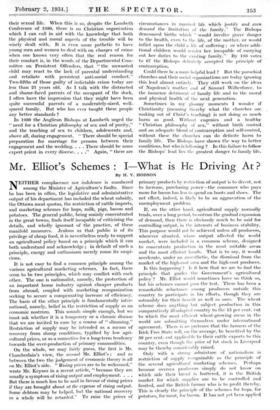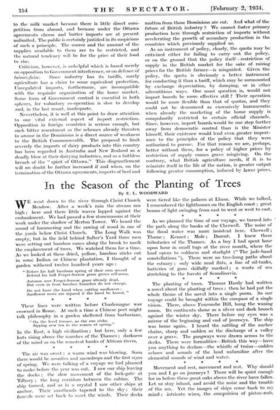Mr. Elliot's Schemes : I What is He Driving At?
By H. V. HODSON
NEITHER complacence nor indolence is numbered among the Minister of Agriculture's faults. Since he has been in office, the legislative and administrative output of his department has included the wheat subsidy, the Ottawa meat quotas, the restriction of cattle imports, and marketing schemes for hops, milk, pigs, bacon and potatoes. The general public, being mainly concentrated in -the great towns, finds itself incapable of criticizing the details, and wholly ignorant of the practice, of these manifold measures. Jealous as that public is of its privilege of cheap food, it is nevertheless ready to support an agricultural policy based on a principle which it can both understand and acknowledge ; in default of such a principle, energy and enthusiasm merely rouse its suspi- cions.
It is not easy to find a common principle among the various agricultural marketing schemes. In fact, there seem to be two principles, which may conflict with each other. The one is nationalist, namely, the protection of an important home industry against cheaper products from abroad, coupled with marketing reorganization seeking to secure a compensating increase of efficiency. The basis of the other principle is fundamentally inter- national, namely, belief in the restriction of supply as an economic nostrum. This sounds simple enough, but we must ask whether it is a temporary or a chronic disease that we are invited to cure by a course of "slimming." Restriction of supply may be intended as a means of recovery from slump conditions, typified by low agri- cultural prices, or as a corrective for a long-term tendency towards the over-production of primary commodities.
On the whole, we may fairly guess, the first is Mr. Chamberlain's view, the second Mr. Elliot's ; and as between the two the judgement of economic theory is all on Mr. Elliot's side. "Rising prices are to be welcomed," wrote Mr. Keynes in a recent article, "-because they are usually a symptom of rising output and employment. . . . But there is much less to be said in favour of rising prices if they are brought about at the expense of rising output. Some debtors may be helped, but the national recovery as a whole will be retarded." To raise the prices of primary products by restriction of output is to divert, not to increase, purchasing power—the consumer who pays more for bacon has less to spend on boots and shoes. The net effect, indeed, is likely to be an aggravation of the unemployment problem.
If, on the other hand, agricultural supply normally tends, over a long period, to outrun the gradual expansion of demand, then there is obviously much to be said for controlling output, in the interests of business stability. This purpose would not be achieved unless all producers,- wherever_ situated, whose output affected the world market, were included in a common scheme, designed to concentrate production in the most suitable areas and the most efficient hands. That is to say, it would accelerate, under an anaesthetic, the dismissal from the market of the high-cost area and the high-cost producer.
Is this happening ? Is it here that we are to find the principle that guides t he Government's agricultural policy'? Mr. Elliot would sometimes have us think so, but his schemes cannot pass the test. There has been a remarkable reluctance among producers outside this country to participate in his efforts, though they are ostensibly for their benefit as well as ours. The wheat scheme does anything but subject production in this comparatively ill-adapted country to the 15 per cent. cut to which the most efficient wheat-growing areas in the world are submitting themselves under international agreement. There is no pretence that the farmers of the Irish Free State will, on the average, be benefited by the 50 per cent. cut applicable to their cattle exports to this country, even though the price of fat stock in Liverpool may be thereby considerably raised. Only with a strong admixture of nationalism is restriction of supply recognizable as the principle of the several agricultural marketing schemes. Perhaps because oversea producers simply do not know on which side their bread is buttered, it is the British market for which supplies are to be controlled and limited, and the British farmer who is to profit thereby. This is clearly the principle of the schemes for hops, for potatoes, for meat, for bacon. It has not yet been applied tb the niilk market because there is little direct com- petition from abroad, and bedause under the Ottawa. agreements cheese and butter imports are at present unlimited. The public is certainly justified in its suspicions of such a principle. The source and the amount of the supplies available to them are to be restricted, and the natural tendency will be for the price of their food to rise.
Criticism, however, is unhelpful which is based merely- on opposition to Government interference, or on defence of laissez-faire. Since industry* has its tariffs, surely agriculture has a claim to some equivalent protection. Unregulated imports, furthermore, are incompatible with the requisite organization of the home market. Some form of Government control is essential in both spheres, for voluntary co-operation is slow to develop and, in the last resort, inadequate.
Nevertheless, it is well at this point to draw attention to one vital external aspect of import restriction. Opposition in foreign countries is serious enough, but such bitter resentment as the schemes already threaten to arouse in the Dominions is a direct source of weakness to the British Commonwealth. The proposal to limit severely the imports of dairy products into this country has been regarded in Australia and New Zealand as a deadly blow at their dairying industries, and as a faithless breach of the " spirit-of Ottawa." This disgruntlement will no doubt be further increased if and when, on the termination of the Ottawa agreements, imports of beef and mutton from those Dominions are cut. And what-Of the future of British industry ?- We cannot 'foster • primary production here through restriction of imports without accelerating the growth of secondary production in the countries which previously supplied us.
' As an instrument of policy, clearly, the quota may be criticized either for failing to carry out the policy, or on the ground that the policy itself—restriction of supply in- the British market for the sake of. raising prices for the British farmer—is misguided. . Given _the policy, the 'quota is. obviously a better instrument for conducting it than :a tariff,. which may be surmounted by exchange depreciation; by dumping, or. in other adventitious ways. One moot question is, would not import boards be more effective still ? Their operation. would be more flexible than that of quotas, and they could not be- denounced as excessively bureaucratic when already the marketing of .the home supply is. compulsorily -restricted to certain official. channels. Since, however, import boards would be one step further away from democratic control than is the Minister himself, their existence would lend even greater import- ance to the principles of the policy that they were authorized to pursue. For that reason we are, perhaps, better without them,. for a policy of higher prices by restriction of supply causes grave misgiving. On the contrary, what British agriculture needs, • if it is to reinstate itself in the life of the nation, is greater output following greater consumption, induced by lower prices.









































 Previous page
Previous page